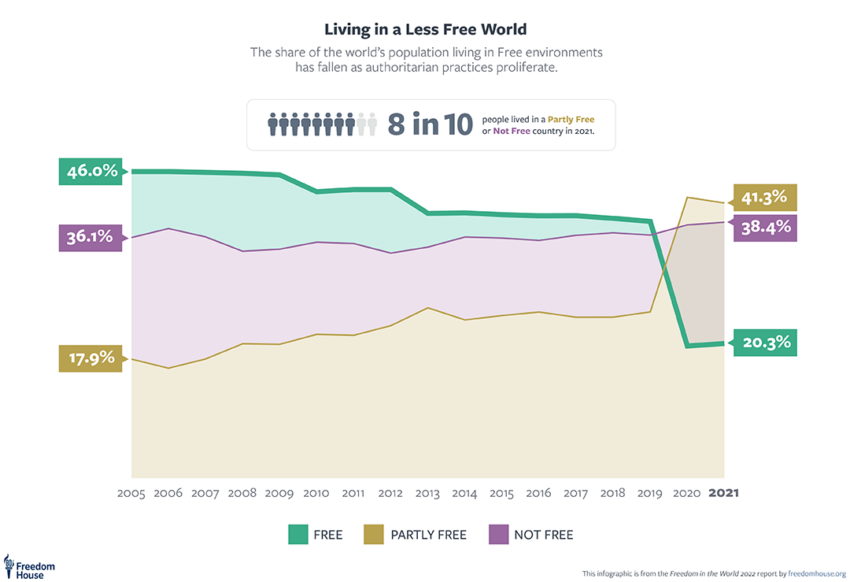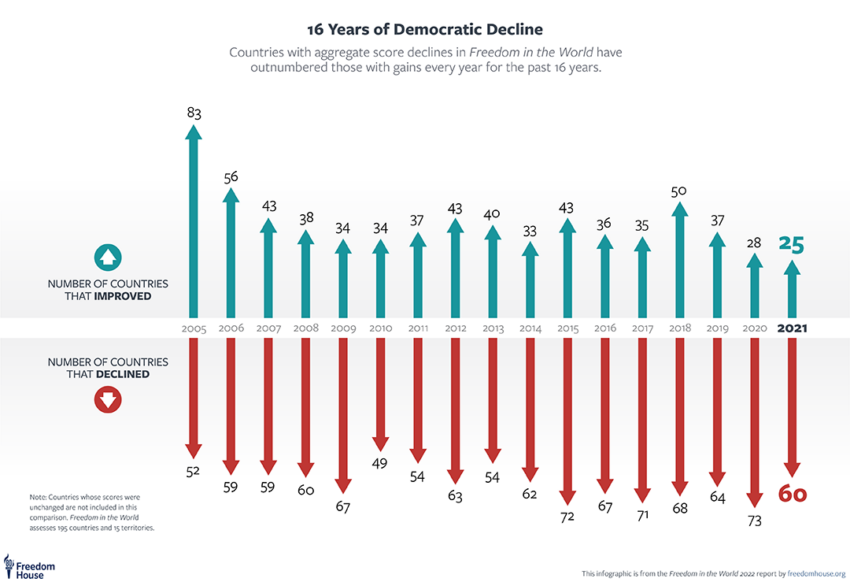Advantages, disadvantages and its impact on democracy

At a time when democracy is under siege, the quest for a secure and reliable voting system has never been more urgent. Enter blockchain technology, with the potential to revolutionize the way we vote and safeguard the democratic process.
But when we delve into the pros and cons of this emerging technology, one must ask: Can blockchain really help secure democracy? Let’s explore the opportunities, challenges and real-world examples of blockchain implementation in the electoral process.
Authoritarianism and the Promise of Blockchain Voting
As authoritarianism rises in countries like Brazil, Turkey and, some say, the United States, democracy faces unprecedented challenges. Accurate and transparent voting is essential for maintaining democratic values.
Blockchain technology offers a potential solution for secure, tamper-proof voting. Despite verified results, about 40% of Americans believe the last presidential election was “stolen,” raising questions about the technology’s effectiveness in ensuring voter confidence.

The promise of Blockchain
Blockchain voting guarantees transparency and integrity in the electoral process. By recording each vote as an encrypted transaction on a decentralized ledger, blockchain ensures that votes are irreversible, traceable and auditable. This prevents tampering and strengthens the credibility of the process.
In addition, blockchain voting systems can use smart contracts to automate various election tasks, such as voter registration, vote counting, and declaration of results, further strengthening trust in the system. Furthermore, blockchain-based voting systems can allow for third-party auditing, bringing even more transparency to the electoral process.
By using decentralized and encrypted ledgers, blockchain significantly reduces the risk of voter fraud and hacking. The decentralized nature of blockchain systems makes it difficult for malicious actors to manipulate the system. Every node in the network verifies transactions, making it nearly impossible for unauthorized access or data changes to go unnoticed.
The use of cryptographic signatures can ensure that only eligible voters can cast their votes, preventing potential fraud. In addition, a distributed denial-of-service (DDoS) attack, which is a common threat to traditional voting systems, will be less effective against a decentralized system.
External and secure electoral options can increase voter turnout by removing geographical barriers and making the process more accessible. Blockchain technology enables secure remote voting from anywhere, potentially benefiting the disabled, remote workers and citizens living abroad.
By streamlining the voting process and reducing reliance on manual procedures, blockchain can also speed up vote counting and declaration of results. This can lead to a more efficient election process, even reducing the time it takes for the results to be published.
The Disadvantages of Blockchain
Blockchain voting is not immune to errors and problems. For example, a 51% attack occurs when a single entity or group gains control of over 50% of the network’s computing power, potentially enabling it to manipulate the ledger. Furthermore, cooperation between participants in the network can also compromise the election results.
Voter coercion, where individuals are forced to vote in a certain way, could persist in a blockchain voting system, destroying the legitimacy of the election. New security measures, such as secure cryptographic protocols, may need to be developed to protect against these threats.
Scalability is another challenge for blockchain voting systems. As the number of voters and transactions increases, the system’s capacity can be strained, resulting in slow transaction times and higher costs. Developers must create systems capable of handling large amounts of data without sacrificing performance or security.
Interoperability is another concern, as integrating different blockchain platforms can prove difficult. This may prevent the widespread use of these voting systems. Establishing industry standards and promoting cooperation between blockchain developers can help solve this problem.
Finally, there are many regulatory challenges, as governments must draft extensive regulations and standards to govern the use of blockchain voting systems, potentially leading to delays in implementation. Policymakers must work closely with technology experts to develop legislation that enables innovation while protecting the integrity of elections.
The digital divide may worsen with the use of blockchain technology. Rural or economically disadvantaged areas with limited internet access may struggle to participate in elections. Moreover, disparities in digital literacy can exclude those who lack the skills to navigate digital voting platforms. To address this issue, governments must invest in infrastructure and education initiatives to bridge the digital divide and ensure equal access to blockchain voting systems.

Examples from the real world
West Virginia’s 2018 blockchain voting pilot targeted military personnel stationed overseas. The Voatz app made voting easier, and while the pilot demonstrated the simplicity of blockchain, it also exposed security and scalability concerns.
Utah followed suit in 2020, implementing blockchain voting for its Republican primary. The experiences of these states provide insight into the challenges and opportunities of adopting this technology on a larger scale.
South Korea’s test of blockchain election systems focuses on improving transparency and limiting fraud. A small trial proved successful, but scalability remains a challenge. Greenland (population 56,000) used blockchain in the 2021 election, showing potential for smaller elections and areas that need improvement. These international examples further demonstrate the potential benefits and current limits of blockchain voting.
Additional considerations
Blockchain voting systems must ensure voter anonymity and privacy. While the transparency of blockchain is good for vote verification, it raises concerns about voter privacy. Developers must create systems that balance transparency with privacy, ensuring that individual voter information remains hidden. Techniques such as zero-knowledge proof and homomorphic encryption can help protect voter privacy while maintaining transparency.
The success of this technology depends on public trust. Citizens need assurance that blockchain voting is secure and accurate. Public education campaigns and transparent audits are key to building trust in the system and addressing misconceptions. Engaging stakeholders, including political parties, election officials and the general public, can help build trust and support for adopting this technology.
Implementation of such voting systems requires significant investment in infrastructure development, including hardware, software and training for election officials. Authorities must weigh these costs against the potential benefits of adopting blockchain technology. Long-term cost savings, such as reduced expenditure on paper ballots and polling stations, should also be considered.

Harnessing Blockchain’s Potential for Democracy
Blockchain presents a promising solution to ensure democracy through transparent, secure and accessible elections. Despite the potential benefits, challenges such as errors, vulnerabilities, scalability and inequities need to be addressed. Real-world examples show both the potential and the limits of blockchain voting.
As the technology matures and these challenges are tackled, blockchain can help secure democracy around the world. But success depends on building trust, ensuring privacy and developing the necessary infrastructure to support the use of this technology. Cooperation between authorities, technology providers and other stakeholders is essential to realizing the full potential for strengthening democratic systems.
Disclaimer
In accordance with Trust Project guidelines, this feature article presents the opinions and perspectives of industry experts or individuals. BeInCrypto is dedicated to transparent reporting, but the views expressed in this article do not necessarily reflect the views of BeInCrypto or its employees. Readers should verify information independently and consult with a professional before making decisions based on this content.























